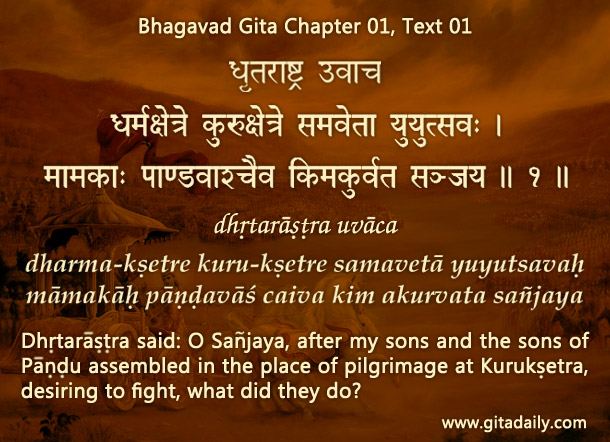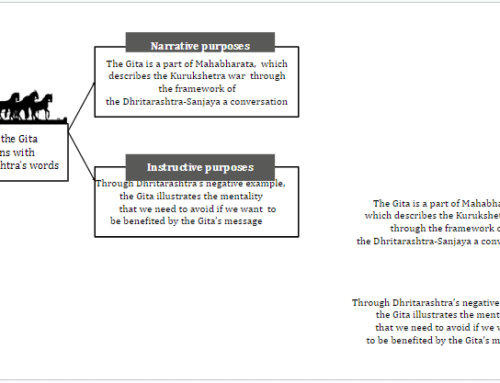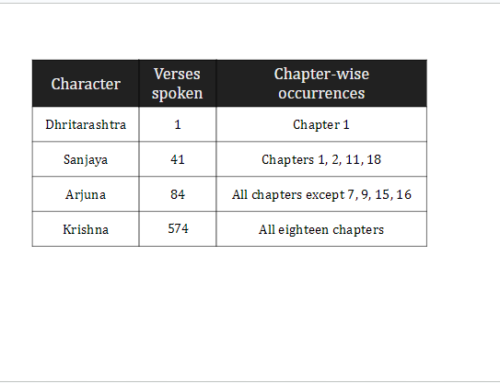Sometimes people fear, “If I become detached, I will become hardhearted.”
However, what makes us hardhearted is not detachment, but its opposite: attachment. When we become attached to something, we experience intense emotions in relation with that object. But those very emotions can impel us towards unbecoming, immoral and hurtful actions, especially towards those whom we see as threats to our attachment.
At the Bhagavad-gita’s start (01.01), Dhritarashtra enquires: On the battlefield of Kurukshetra, what did my people and the Pandavas do? The question reveals his bias – the Pandavas too were his people, being his nephews. Moreover, he was meant to care for them as a surrogate father after the untimely demise of their own father Pandu. The Pandavas, on their part, had consistently respected him as if he was their father. But Dhritarashtra was irrationally attached to his oldest son Duryodhana. Being morally deadened by that attachment, he had repeatedly consented to Duryodhana’s nefarious schemes for eliminating the Pandavas whom that envious prince resented as rivals.
Dhritarashtra’s attachment made him so hard-hearted that he cheered when during a rigged gambling match Duryodhana stripped the Pandavas of all their wealth, and abused them and even their honorable wife Draupadi. And now he had stooped to the level of seeing the Pandavas as the other whose destruction he hoped for. What can be more hardhearted than wanting the death of those whom one is meant to protect? If only Dhritarashtra had some detachment from Duryodhana, his heart would have softened towards the Pandavas. And those emotions would have inspired him to act virtuously instead of viciously.
Thus, if we fear becoming hardhearted, we should be worried about being attached, not detached. Attachment can make us shockingly hardhearted, whereas detachment can make us emotionally intelligent, capable of eschewing degrading emotions and embracing elevating emotions.
To know more about this verse, please click on the image
Explanation of article:
Podcast:
Download by “right-click and save content”
Hindi Translation by Rasik Shyam Prabhu
अनासक्ति हमें निष्ठुर नहीं बनाता है-आसक्ति ऐसा बना देता है ।
कभी कभी लोग डरते हैं कि “यदि मैं लगाव रहित हो गया तो मैं कठोर ह्रदयी बन जाऊंगा।”
लेकिन ऐसा नहीं है, अनासक्ति हमें निष्ठुर नहीं बनाता है बल्कि इसके विपरीत आसक्ति हमें पाषाणहृदयी अवश्य बना देता है । जब कभी हम किसी वस्तु से असक्त हो जाते है तो उस वस्तु के प्रति हम सघन भावनाओं को अनुभव करते हैं, लेकिन यह ध्यान रहे कि यहीं भावनायें हमको अशोभनीय, अनैतिक, हानिकारक तथा ह्रदय को चोट पहुँचाने वाली क्रियाओं के प्रति हमको प्रेरित कर सकती हैं । खासकर उन लोगों के प्रति जिनको हम, हमारे आसक्ति के प्रति रूकावट या खतरा मानते है ।
भगवत गीता के आरम्भ (१.१) में धृतराष्ट्र ने संजय से पूछा कि “धर्मक्षेत्र कुरुक्षेत्र के युद्धस्थल में युद्ध की इच्छा से एकत्रित मेरे तथा पांडु पुत्रों ने क्या किया ?” यह प्रश्न उनके पक्षपाती प्रकृति को प्रकट करता है । उनके भतीजों के रूप में पाण्डव उनके अपने थे एवं अपने छोटे भाई पांडु के मृत्युं के पश्चात् धृतराष्ट्र को अपने भतीजे पांडवों के प्रति एक धर्म पिता के तौर पर रक्षण रूपी अपने कर्तव्य का वहन करना चाहिये था । पांडव भी धृतराष्ट्र को अपने पिता के समान हीं सम्मान करते थे ।
परन्तु धृतराष्ट्र अविवेकी मनुष्य की तरह अपने सबसे बड़े पुत्र दुर्योधन से आसक्त हो गये और इसी आसक्ति के कारण नैतिकता से नीरस होकर वे सदा पांडवों को समाप्त करने हेतु दुर्योधन के द्वेषपूर्ण एवं जघन्य योजनाओं को अपना सहमती देते रहे, जिनको वह द्वेषी राजकुमार अपने प्रतिद्वंदी की तरह द्वेष करता था ।
अपने पुत्र मोह के वसीभूत होकर धृतराष्ट्र इतने कठोर हृदयी बन गये कि जब द्यूतक्रीड़ा में छल से दुर्योधन ने पांडवों के समस्त धन सम्पदा को हथिया कर उनको तथा उनकी सम्मानीय पत्नी द्रौपदी को भी नाना प्रकार से अपमानित करने लगे तब वे इसपर दुःख प्रकट करने के स्थान पर प्रसन्न होने लगे । इससे और नीचे तब गिर गये जब वे पांडवों की मौत अपने अन्य शत्रुओं की तरह चाहने लगे इससे ज्यादा निष्ठुरता और क्या हो सकती है, कि जिनको हमें सुरक्षा प्रदान करना चाहिये, उनका हम मौत चाहते है ? यदि उनको दुर्योधन के प्रति थोडा-सा भी अनासक्ति होता तो वे पांडवों के प्रति कोमलता अवश्य दिखाते और वे हीं भाव उनको निन्दनीय कर्म के स्थान पर धर्मपरायण के तरह से कर्म करने हेतु प्रेरित करते ।
इसप्रकार यदि हम क्रूर बनने से भयभीत हैं तो हमें अनासक्त होने से डरना चाहिये । जहाँ आसक्ति हमको पाषणहृदयी बना देता है वहीँ अनासक्ति हमें भावनात्मक तौर पर बुद्धिमान, निकृष्ट भावनाओं को त्यागने और श्रेष्ठ भावनाओं को स्वीकार करने हेतु योग्य बना देता है ।
धृतराष्ट्र ने कहा –हे संजय धर्मक्षेत्र कुरुक्षेत्र में युद्ध कि इच्छा से एकत्रित मेरे तथा पांडु पुत्रों ने क्या किया ?




Pranaam Marvelous coincident! Yesterday, Saturday 24.10.15 in the chapter on ShrimadBhagavadGita, I wrote just that!!, among other points.
shubham karoti kalyaanam
Very well written Prabhuji. Haribol !! I could understand it.